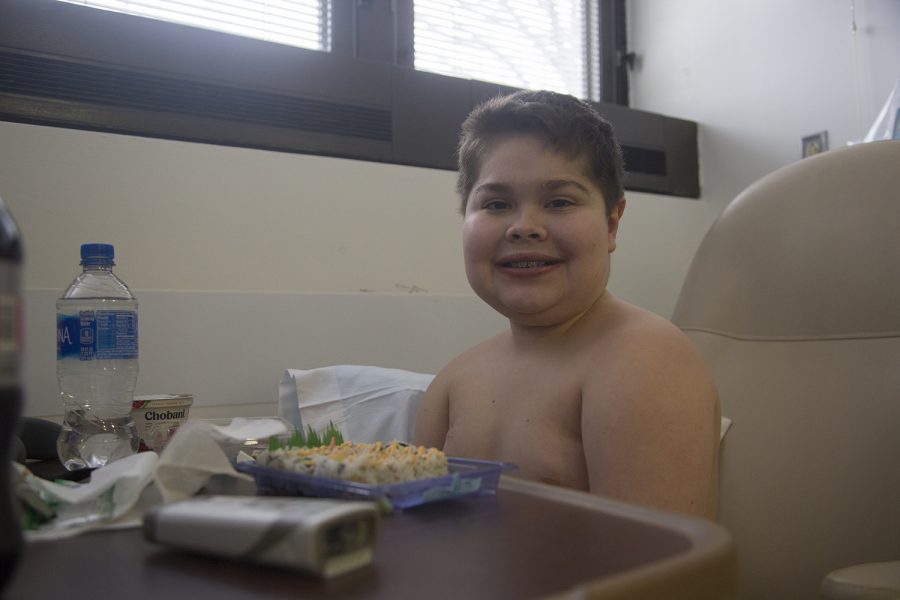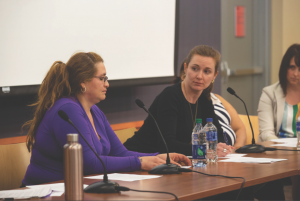Child receiving experimental treatment from UIHC flies frequently from Minnesota to Iowa
Twelve-year-old Ben makes frequent trips to the hospital from his hometown in Minnesota to receive an experimental treatment for his Duchenne muscular dystrophy.
Ben Shussler (12) poses for a portrait at Boyd Tower in UIHC on Friday, March 8, 2019. Shussler flies in weekly to receive treatments for Duchenne muscular dystrophy, conducted by Dr. Katherine Mathews as part of a research study.
April 3, 2019
Not many could board a plane to go to a hospital 265 miles from their home every week and still have a smile on their face, but 12-year-old Ben Schussler does it with ease.
Today, Ben’s flights are less frequent — only around one a month — as he enters the next phase of an experimental treatment he receives as part of a clinical study involving patients with a particular type of Duchenne muscular dystrophy.
University of Iowa Professor Katherine Mathews, the principal investigator in the study, Duchenne is an inherited genetic disorder marked by progressive degeneration of the muscles. The disease almost exclusively affects boys.
“[Duchenne] typically presents with weakness between 2 to 4 years old and is caused by the lack of a specific protein that allows your muscle cells to break down over time,” Mathews said. “As that happens, those muscle cells can die.”
Ben was diagnosed with the disease at age 4. Now, accompanied by one of his “Ben’s Team” members, he boards a 9 a.m. plane close to his hometown of Eagan, Minnesota, and flies to the Eastern Iowa Airport near Cedar Rapids.
From there, it’s a 25-minute drive in a rental car to the clinical research unit at the UI Hospitals & Clinics, where he receives an hourlong infusion as a part of a clinical trial for a new therapy will change the progression of Duchenne dystrophy, said Mathews, a pediatric neurologist at the UI Stead Family Children’s Hospital.
The infusions are weekly, but now Ben can receive the majority of them at home. Other weeks, Ben and his escort for that day spend the day in airports and Iowa City. Ben’s mother, Missy Schussler, said the escort system developed after community members started to help the family with their frequent trips.
RELATED: UI partners in muscular dystrophy battle
“It started out with just myself and Frank, then his dad went, and my niece, and then my close friend Susanne,” she said. “We were all kind of rotating, but with our full-time jobs, it just became a lot to try to juggle all of that.”
Although the treatment Ben receives is experimental and not yet proven to be effective, Schussler said she had zero hesitations when deciding to allow Ben to participate in the study.
“There’s nothing out there for Duchenne muscular dystrophy,” she said. “There’s nothing out there that can better their quality of life, so Frank and I have been on the same page since Day 1 that we would get [Ben] into anything.”
Ben enjoys the trips, because they typically include a day of playing his favorite game, Fortnite, and going to lunch at Panera Bread in Iowa City.
“The companion comes to my house, and they pick me up, drive to the airport, get on the plane, fly there, get all my stuff done, and after my infusion is done, we pack up, drive back to the airport, get dinner sometimes and fly back to Minnesota,” he said.
Ben usually brings his tablet along with him to treatments, but that didn’t stop him and members of his community from raising money to provide for gaming equipment for other patients to use while in the clinical research unit.
Ben is nearly finished with the clinical trial, which consists of two 96-week rounds.
“It’s a hopeful time across the whole field,” Mathews said. “Ben is in one study, but there are lots of other studies being tested in Duchenne muscular dystrophy and a lot of other kinds of muscular dystrophy.”






